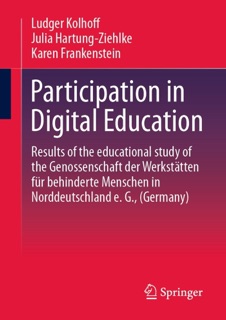Digital education offers support the equal participation of people with disabilities in lifelong learning. They thus provide access for independent living and participation in all areas of life and are highlighted as a central factor of successful inclusion. In order to give people with impairment the opportunity to participate in digital education, the educational and qualification needs of people with impairment in 10 member institutions of the Cooperative of Workshops for Disabled People in Northern Germany e.G. were recorded in 2016 - 2018.
The authors:
Prof. Dr. Ludger Kolhoff represents the field of social management at the Faculty of Social Work at Ostfalia (University of Applied Sciences Braunschweig/Wolfenbüttel). He has led the master's program "Social Management" since 2001 and the model project for the development and implementation of digital educational offers for the qualification of severely disabled people for the general labor market (01.09.2019 - 31.08.2022) as well as the model project Opportunities of digitalization for the self-determined labor market qualification of people with severe disabilities (01.03.2023 - 28.02.2026).
Dr. Julia Hartung-Ziehlke is a research assistant at the Faculty of Social Work at Ostfalia (University of Applied Sciences Braunschweig/Wolfenbüttel). She coordinated the “Model project for the development and implementation of digital educational offers for the qualification of severely disabled people for the general labour market” and will be coordinating the model project “Opportunities of digitalization for the self-determined labour market qualification of people with severe disabilities“.
Dr. Karen Frankenstein is a research assistant at the Faculty of Social Work at Ostfalia (University of Applied Sciences Braunschweig/Wolfenbüttel). She is currently co-coordinating and conducting research in the model project “Opportunities of digitalization for the self-determined labour market qualification of people with severe disabilities“.
This book is a translation of an original German edition. The translation was done with the help of artificial intelligence (machine translation by the service DeepL.com). A subsequent human revision was done primarily in terms of content, so that the book will read stylistically differently from a conventional translation.
















